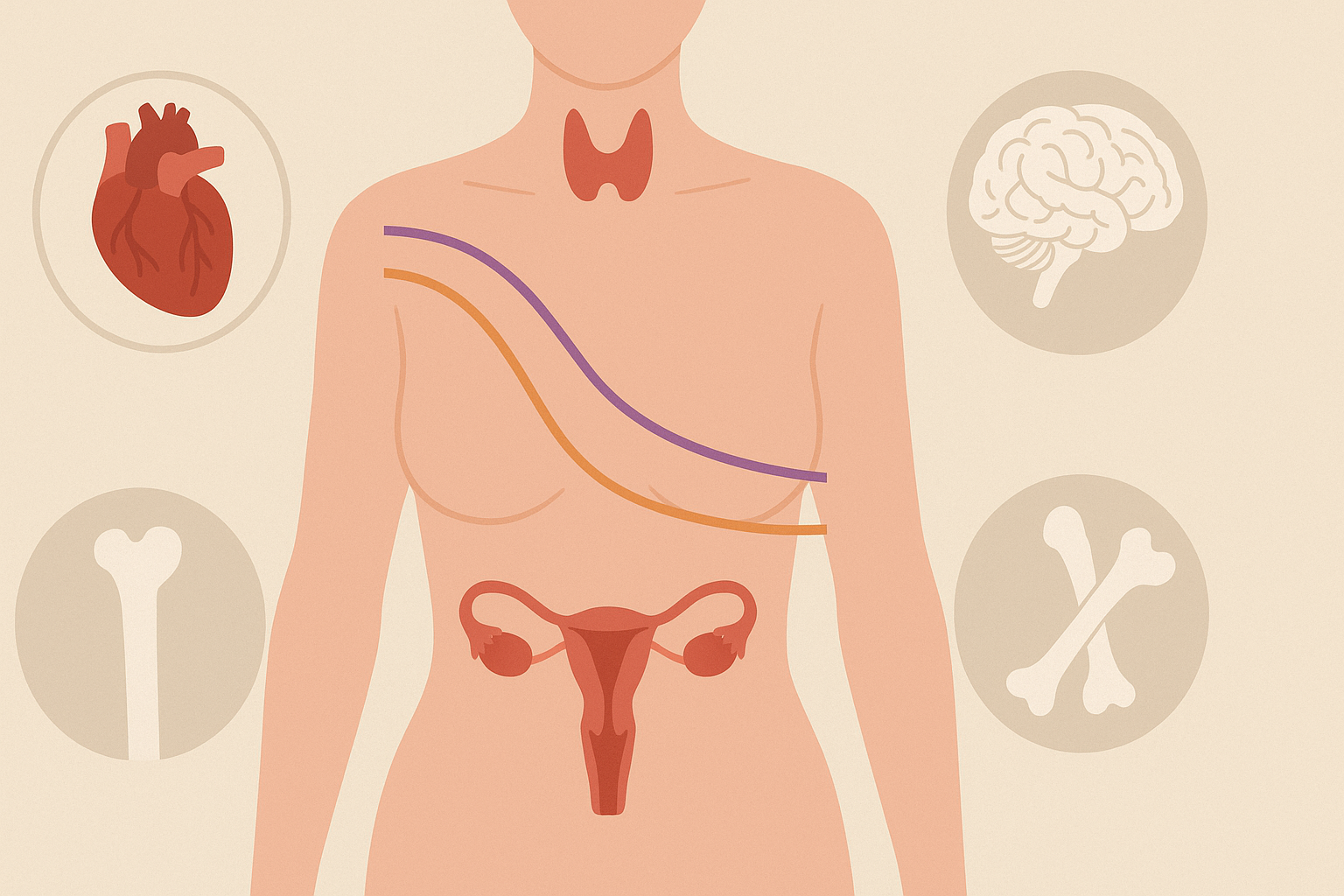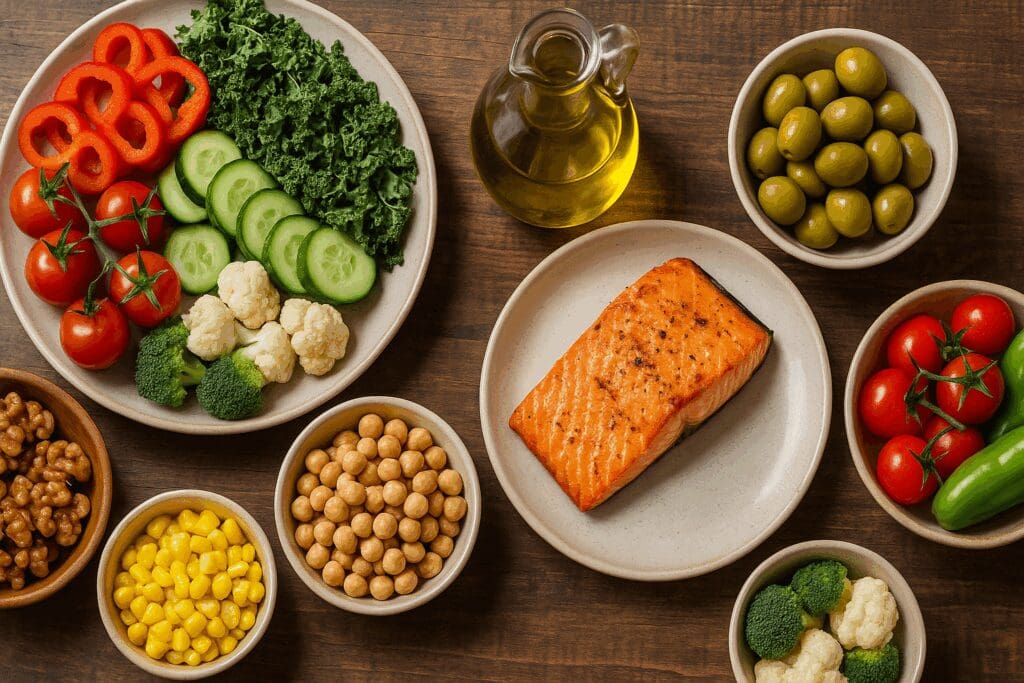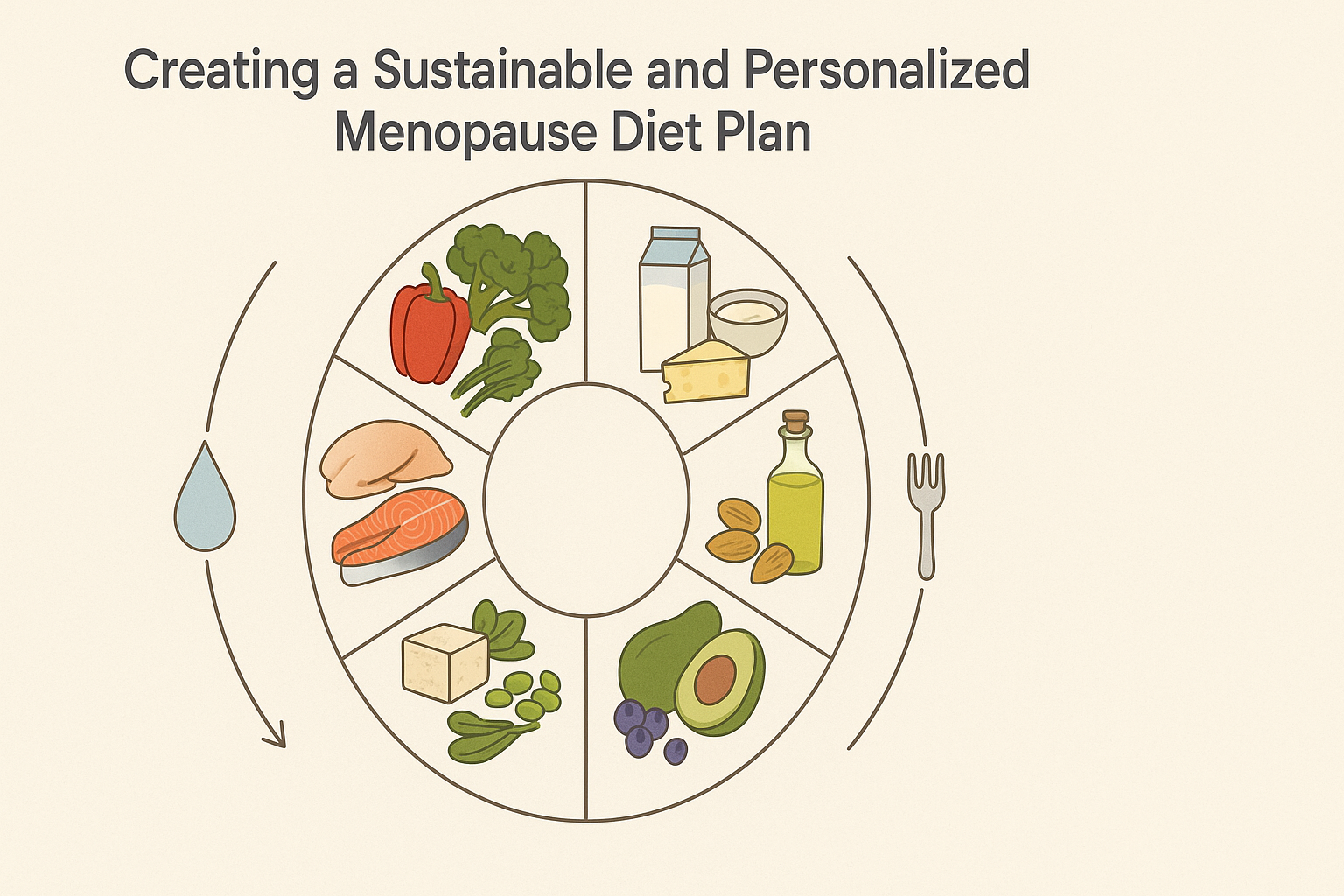Menopause is a profound life transition that brings about significant hormonal, emotional, and physiological changes. As estrogen levels decline, many women face new challenges, including weight gain, bone density loss, hot flashes, mood swings, and an increased risk for cardiovascular disease. Choosing the right diet for menopause is one of the most powerful tools a woman can utilize to support her health, manage symptoms, and thrive during this transformative stage of life. The diet for menopause isn’t a one-size-fits-all plan, but rather an evolving strategy that must be tailored to the individual’s unique body, symptoms, lifestyle, and medical history. In this comprehensive guide, we explore the science behind menopause nutrition, debunk common myths, and provide actionable insights on building a menopause diet plan that promotes energy, balance, and long-term well-being.
You may also like: 10 Essential Tips on Choosing Healthy Food for Ladies to Boost Energy and Wellness

Understanding the Hormonal Shifts That Influence Nutritional Needs
To understand why dietary changes become critical during menopause, it’s essential to first explore the hormonal changes that drive this stage of life. Menopause is marked by the cessation of menstrual cycles for twelve consecutive months and is typically accompanied by a significant drop in estrogen and progesterone levels. These hormonal declines affect nearly every system in the body, altering metabolism, fat distribution, blood sugar regulation, and cholesterol levels.
Estrogen has a protective effect on cardiovascular health by maintaining flexible blood vessels and supporting healthy cholesterol levels. When estrogen decreases, women become more vulnerable to heart disease, which is why heart-smart dietary patterns are especially important post-menopause. In addition, the reduction in estrogen contributes to decreased calcium absorption, accelerating bone loss and increasing the risk for osteoporosis. These physiological shifts create an urgent need for nutritional recalibration to ensure adequate intake of bone-strengthening nutrients like calcium, magnesium, and vitamin D.
Hormonal fluctuations can also impact mood, cognitive clarity, and sleep patterns. The right foods can help modulate neurotransmitters such as serotonin and dopamine, which play a critical role in regulating mood and sleep. Therefore, incorporating nutrient-dense, anti-inflammatory foods can help stabilize these systems and provide essential support during menopause.

Why the Best Diet for Menopause Must Be Anti-Inflammatory and Nutrient-Rich
A hallmark of menopause is the presence of systemic inflammation, which arises due to the interplay of hormonal changes, oxidative stress, and aging. Chronic low-grade inflammation is associated with a host of menopausal symptoms, including joint pain, fatigue, and metabolic disturbances. Consequently, the best diet for menopause is one that is rich in anti-inflammatory compounds, such as antioxidants, phytonutrients, and omega-3 fatty acids.
Fruits and vegetables are indispensable components of a menopause diet plan because they are abundant in antioxidants like vitamin C, beta-carotene, and polyphenols. Leafy greens, berries, citrus fruits, and cruciferous vegetables like broccoli and kale support detoxification pathways in the liver and reduce oxidative stress. Moreover, these foods provide fiber, which helps stabilize blood sugar levels and promotes digestive regularity.
Omega-3 fatty acids found in fatty fish like salmon, sardines, and mackerel, as well as in walnuts, flaxseeds, and chia seeds, are essential for cardiovascular and cognitive health. Omega-3s help lower triglycerides, reduce inflammation, and support brain function, all of which are especially relevant during menopause. Incorporating these fats into the diet also contributes to hormonal balance by supporting cell membrane health and the production of hormone-regulating compounds called eicosanoids.
Whole grains, legumes, and nuts are additional pillars of an anti-inflammatory menopause diet. These foods are excellent sources of B vitamins, magnesium, and plant-based proteins, and they help maintain stable energy levels and healthy weight management. A diet focused on these foods not only helps alleviate symptoms but also reduces long-term risks associated with aging.

Protein: A Cornerstone in the Diet for Menopause
Protein becomes increasingly important as women age, particularly during and after menopause. Age-related sarcopenia—the natural loss of muscle mass—can be accelerated by estrogen decline, leading to weakness, reduced metabolic rate, and increased fat accumulation. To counteract this process, women should prioritize protein intake at every meal.
Research suggests that menopausal women benefit from a slightly higher protein intake than the general adult population. Including high-quality protein sources such as eggs, poultry, tofu, tempeh, legumes, Greek yogurt, and lean meats can help preserve lean body mass, promote satiety, and support bone health. Protein also plays a critical role in blood sugar regulation by slowing the absorption of carbohydrates, reducing the likelihood of insulin spikes and crashes.
In addition to whole-food protein sources, strategic supplementation with protein powders such as collagen peptides or plant-based blends can be useful, especially for women who struggle to meet their protein needs through food alone. Collagen, in particular, supports skin elasticity and joint health, which can be affected by the hormonal shifts of menopause. However, supplementation should always be guided by individualized needs and, when possible, the advice of a qualified health professional.

The Role of Phytoestrogens in a Menopause Diet Plan
Phytoestrogens are naturally occurring plant compounds that mimic estrogen in the body by binding to estrogen receptors, though with weaker effects. These compounds are especially beneficial during menopause when endogenous estrogen levels decline. Incorporating foods rich in phytoestrogens can provide gentle hormonal support and reduce the intensity of menopausal symptoms such as hot flashes, night sweats, and mood fluctuations.
Soy products, including tofu, edamame, miso, tempeh, and soy milk, are among the most studied sources of phytoestrogens. Clinical trials have shown that regular consumption of soy isoflavones can modestly reduce the frequency and severity of hot flashes. Importantly, these foods are also excellent sources of plant-based protein, making them doubly valuable in a diet for menopause.
Other foods rich in phytoestrogens include flaxseeds, sesame seeds, legumes, and certain fruits and vegetables. Ground flaxseed, for example, contains lignans—a type of phytoestrogen that also provides fiber and supports digestive health. The inclusion of these foods in daily meals not only supports hormonal balance but also promotes cardiovascular and metabolic health.
Navigating Weight Management with the Best Diet for Menopause
One of the most common and frustrating challenges women face during menopause is unexpected weight gain, particularly around the abdomen. This shift in fat distribution is partially driven by the loss of estrogen, which alters how the body stores fat. Additionally, metabolic rate naturally declines with age, making it easier to gain weight even without dietary changes.
The best diet for menopause addresses these concerns by focusing on nutrient density, portion control, and metabolic support. Reducing intake of added sugars, refined carbohydrates, and processed foods is critical, as these can trigger insulin resistance and promote fat storage. Instead, emphasizing whole foods, lean proteins, healthy fats, and complex carbohydrates helps maintain energy levels without excess caloric intake.
Intermittent fasting has also emerged as a promising strategy for some menopausal women. By limiting the eating window to certain hours of the day, intermittent fasting may improve insulin sensitivity and support weight management. However, this approach should be personalized, as some women may experience increased stress or hormonal imbalances with restrictive eating patterns.
Exercise, while not part of the diet itself, plays a complementary role in managing weight and boosting metabolic rate. Resistance training, in particular, supports muscle retention and fat loss, making it an essential partner to a menopause diet plan focused on long-term weight stability.

Diet for Menopause and Bone Health: Building a Strong Foundation
Bone health is another critical consideration when crafting a diet for menopause. The decrease in estrogen after menopause accelerates bone loss, increasing the risk of osteoporosis and fractures. Therefore, a targeted dietary approach that supports bone mineral density is essential.
Calcium is a key nutrient for maintaining bone strength, and women over 50 should aim for 1,200 mg per day. Dairy products like yogurt, kefir, and cheese are traditional sources of calcium, but plant-based options such as fortified plant milks, leafy greens, almonds, and sesame seeds also contribute meaningfully. To enhance calcium absorption, adequate vitamin D levels are crucial, which can be obtained through moderate sun exposure, fatty fish, fortified foods, and supplementation when needed.
Magnesium, vitamin K2, and boron also play important roles in bone metabolism. Foods such as avocados, nuts, legumes, and leafy greens support magnesium intake, while fermented foods and grass-fed animal products provide vitamin K2. Ensuring that these nutrients are included regularly can fortify the skeletal system and reduce the risk of age-related bone loss.
The Importance of Gut Health in the Menopausal Transition
Emerging research highlights the intimate connection between gut health and hormonal balance, particularly during menopause. The gut microbiome plays a role in estrogen metabolism through the estrobolome—a collection of gut bacteria that regulate the reabsorption and excretion of estrogen. A healthy gut microbiome can therefore influence the body’s estrogen levels and symptom severity.
A diet that promotes gut diversity and supports microbial health is essential during menopause. This includes eating a variety of fiber-rich fruits, vegetables, legumes, and whole grains, which serve as prebiotics to feed beneficial gut bacteria. Fermented foods such as kimchi, sauerkraut, kefir, and yogurt introduce probiotics that help maintain microbial balance.
In addition, minimizing ultra-processed foods, artificial sweeteners, and excess alcohol is vital for preserving gut integrity and preventing inflammation. When the gut lining becomes compromised, it can lead to systemic inflammation and exacerbate menopausal symptoms. Therefore, taking care of the gut is a foundational aspect of a holistic menopause diet plan.

Mood, Memory, and Mental Well-Being: Nutritional Strategies That Support the Brain
Menopause is often accompanied by changes in mood, memory, and cognitive function, commonly referred to as “brain fog.” These shifts are driven by declining estrogen, which influences neurotransmitters like serotonin and dopamine. Nutrition can play a powerful role in modulating brain chemistry and supporting mental clarity.
Foods rich in B vitamins, particularly B6, B12, and folate, support neurotransmitter synthesis and are vital for mood regulation. Leafy greens, eggs, lentils, and nutritional yeast are excellent sources of these vitamins. Omega-3 fatty acids, once again, emerge as crucial allies for brain health, as they are involved in the structure of neuronal membranes and inflammation regulation.
Complex carbohydrates, such as oats, quinoa, and brown rice, provide a steady release of glucose to fuel brain activity. These foods help stabilize blood sugar and prevent mood swings triggered by energy crashes. On the other hand, excessive consumption of simple sugars can lead to cognitive sluggishness and exacerbate emotional fluctuations.
Staying hydrated is another often-overlooked component of cognitive health. Even mild dehydration can impair concentration and short-term memory. Ensuring a consistent intake of water, herbal teas, and hydrating fruits can support brain function and contribute to overall mental well-being.

Creating a Sustainable and Personalized Menopause Diet Plan
No two women experience menopause in exactly the same way, which is why a personalized approach is key to success. The ideal diet for menopause is one that aligns with individual health goals, dietary preferences, cultural traditions, and lifestyle constraints. Rather than adopting a restrictive or fad-based diet, the focus should be on creating sustainable habits that nourish the body and support hormonal harmony.
Start by identifying key symptoms that need to be addressed, whether it’s weight gain, hot flashes, insomnia, or low energy. Tailor dietary choices accordingly, emphasizing foods that provide the specific nutrients and support needed for those issues. For instance, women struggling with sleep disturbances might benefit from magnesium-rich foods in the evening, while those experiencing mood swings may find relief through increased intake of omega-3s and complex carbohydrates.
Meal planning and preparation can enhance adherence and reduce the temptation to rely on convenience foods. Batch cooking, using seasonal produce, and incorporating a variety of cuisines can make healthy eating enjoyable and diverse. Support systems—whether through a registered dietitian, online community, or accountability partner—can provide motivation and guidance during the journey.
Reflecting on the Transformational Power of Nutrition During Menopause
Menopause is not a decline, but a transformation—an invitation to redefine what health and vitality mean in the second half of life. Nutrition plays an essential role in shaping that transformation, providing the building blocks for physical resilience, emotional balance, and mental clarity. By choosing a diet for menopause that is anti-inflammatory, protein-rich, phytonutrient-dense, and deeply nourishing, women can reclaim their energy, protect their bones, stabilize their mood, and reduce their risk for chronic disease.
This journey is not without its challenges, but the rewards of intentional eating are profound. Food becomes more than fuel; it becomes a daily act of self-respect, a way to honor the body’s evolving needs, and a path toward thriving in the years ahead. As research continues to illuminate the connections between diet and hormonal health, one thing remains clear: the way we eat during menopause has the power to shape not only how we age, but how we live.
Ultimately, the best diet for menopause is one rooted in whole, colorful, minimally processed foods that reflect the unique beauty and strength of the women it serves. With knowledge, intention, and self-compassion, every woman has the tools to create a nourishing menopause diet plan that supports her journey with grace, vitality, and lasting wellness.
Frequently Asked Questions: Science-Backed Strategies for the Best Diet for Menopause Relief and Resilience
1. Why is tailoring a diet for menopause critical beyond just weight management?
A well-designed diet for menopause does much more than help with weight—it directly impacts hormone regulation, inflammation, cognitive health, and cardiovascular function. As estrogen declines, women become more vulnerable to insulin resistance, bone density loss, and mood instability. Strategic dietary choices—such as incorporating magnesium-rich leafy greens, omega-3 fatty acids, and fermented foods—can help support neurotransmitter balance and gut microbiome diversity. Unlike generalized eating plans, a menopause diet plan must be targeted to address these biological shifts. It’s not just about eating less; it’s about eating smarter to preserve quality of life.
2. How does the best diet for menopause reduce the risk of chronic diseases?
The best diet for menopause places strong emphasis on inflammation control and insulin sensitivity. This includes consuming foods like turmeric, fatty fish, berries, and flaxseeds that help regulate blood sugar and suppress inflammatory pathways. Menopausal women face increased risk for cardiovascular disease, Type 2 diabetes, and osteoporosis—conditions that can be significantly influenced by daily nutrition. A consistent intake of phytonutrients, soluble fiber, and calcium-rich vegetables can play a preventive role. Addressing disease risk through diet not only adds years to life but life to those years.
3. Can gut health influence the effectiveness of a menopause diet plan?
Absolutely. Gut bacteria are involved in estrogen metabolism via the estrobolome—a subset of microbes that affect how estrogen is recycled or eliminated. When the gut is imbalanced, this process can go awry, exacerbating menopausal symptoms like bloating, brain fog, or hot flashes. A strong menopause diet plan includes prebiotic fibers from foods like asparagus and garlic, as well as fermented products like kefir and kimchi to maintain microbial diversity. Prioritizing gut health isn’t just trendy—it’s fundamental to the hormonal harmony a diet for menopause aims to achieve.
4. What role do phytoestrogens play in the best diet for menopause?
Phytoestrogens are naturally occurring plant compounds that mimic estrogen in the body, providing mild hormonal support during menopause. Found in foods like soy, flaxseeds, and lentils, they may help reduce hot flashes, maintain bone health, and improve cholesterol profiles. However, they must be consumed in consistent and moderate amounts to be effective. The best diet for menopause doesn’t overload on any one phytoestrogen source but incorporates them strategically throughout the week. While not a replacement for hormone therapy, they can offer valuable support with fewer side effects.
5. How should protein intake shift in a menopause diet plan?
Protein becomes more crucial after menopause due to its role in preserving muscle mass, supporting bone health, and regulating appetite. While younger adults may thrive on lower protein diets, a menopause diet plan benefits from increased intake—often 1.0–1.2 grams per kilogram of body weight. Sources like eggs, Greek yogurt, and legumes offer nutrient-dense options that also support gut health and hormone regulation. It’s also helpful to distribute protein intake evenly across meals to maintain stable blood sugar and satiety. Timing matters just as much as quantity.
6. What makes hydration uniquely important in the best diet for menopause?
Estrogen influences fluid retention and electrolyte balance, so when levels drop during menopause, women can experience dry skin, fatigue, and even joint discomfort. Hydration supports thermoregulation, cognitive function, and digestion—all of which can become compromised during this stage of life. The best diet for menopause includes not only water but also hydrating foods like cucumbers, oranges, and soups. Adding a pinch of sea salt or magnesium-rich powders to water can improve absorption. Staying properly hydrated can help reduce hot flashes, improve mood, and support metabolic detoxification.
7. Are there specific eating patterns that support the best diet for menopause?
Time-restricted eating, Mediterranean-inspired frameworks, and anti-inflammatory meal sequencing are among the most beneficial patterns. These approaches complement a diet for menopause by lowering insulin load and improving circadian hormone balance. For example, eating earlier in the day aligns with cortisol rhythms and may reduce night sweats or insomnia. The Mediterranean model—rich in olive oil, legumes, fish, and fresh produce—is particularly adaptable as a menopause diet plan because of its heart-protective and mood-enhancing effects. Personalized meal timing and composition often yield better outcomes than rigid calorie counting.
8. How can emotional eating be addressed within a diet for menopause?
The intersection of hormonal shifts and psychosocial stressors often triggers emotional eating in menopausal women. A well-designed diet for menopause acknowledges this by including mood-stabilizing nutrients like magnesium, omega-3s, and B vitamins. It also encourages mindfulness-based eating, journaling, and structured meal routines to disrupt cycles of guilt and deprivation. Emotional satisfaction can be preserved through texture, color, and flavor variety without compromising nutrient quality. Understanding emotional patterns allows women to build a more compassionate and sustainable menopause diet plan.
9. Is it possible to customize a menopause diet plan around cultural or dietary preferences?
Yes—and this flexibility is essential for sustainability. The best diet for menopause doesn’t require abandoning cultural identity or personal ethics like vegetarianism or gluten-free living. For example, turmeric-based dishes in Indian cuisine or tofu-rich Asian meals can offer anti-inflammatory and phytoestrogen benefits. Latin American diets can incorporate beans, avocados, and squash—all menopause-friendly staples. A personalized, culturally inclusive approach is not only respectful but increases adherence and long-term success.
10. What are the long-term benefits of maintaining a consistent diet for menopause?
Sticking with a consistent diet for menopause offers protective benefits that extend well beyond symptom relief. Over time, it can stabilize blood pressure, support cognitive clarity, improve skin elasticity, and promote restful sleep. It also reduces dependency on pharmaceutical interventions for cholesterol, blood sugar, and mood disorders. The best diet for menopause is a long-term investment—not just a short-term fix. Its cumulative effects lead to a healthier, more vibrant postmenopausal life, both physically and emotionally.
Conclusion: Embracing Long-Term Wellness Through the Right Menopause Diet Plan
As women navigate the complex physical and emotional shifts of menopause, nutrition emerges as a cornerstone of proactive health care. Crafting a diet for menopause that is rich in anti-inflammatory foods, bone-strengthening nutrients, and hormone-balancing compounds empowers women to take charge of their well-being with confidence and clarity. Far beyond symptom management, the right menopause diet plan offers a powerful framework for preventing chronic diseases, supporting cognitive function, and cultivating emotional resilience.
The benefits of this holistic approach are far-reaching, touching every system in the body and laying the groundwork for a vibrant postmenopausal life. From boosting energy levels to enhancing sleep and mood stability, the choices women make at the table have a profound impact on their daily quality of life. With thoughtful adjustments tailored to individual needs and a focus on nourishing the body from within, every woman can approach this life stage not with trepidation but with purpose and self-assurance.
Let this guide serve as a reminder that menopause is not the end of vitality, but a new beginning shaped by empowered decisions. Through the lens of nutritional science, women can write a new chapter rooted in strength, balance, and longevity—all through the transformative power of food.
Further Reading:
What should you eat during menopause?
Menopause Diet: How What You Eat Affects Your Symptoms
7 Day High-Protein Meal Plan for Menopause, Created by a Dietitian



